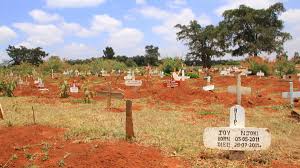Nairobi, the capital city of Kenya, is home to several cemeteries, both public and private, where people from diverse cultural, religious, and social backgrounds are laid to rest. Most of these cemeteries are managed by the County Government of Nairobi, with others serving specific communities or religious groups. Below is a comprehensive list of the cemeteries located in Nairobi.
1. Lang’ata Cemetery
Lang’ata Cemetery is one of the largest public cemeteries in Kenya, covering 120 acres. Managed by the County Government of Nairobi, it is located along Lang’ata Road. It offers both permanent and temporary graves, with fees ranging from Kshs 30,500 for adults and Kshs 4,000 for children for permanent graves, while temporary graves cost Kshs 7,000 for adults and Kshs 4,000 for children. This cemetery has been in the spotlight due to overcrowding and limited available space for new burials.
- Location: Lang’ata Road
2. Kariokor Cemetery
One of Nairobi’s oldest cemeteries, Kariokor Cemetery is located in Starehe Constituency, close to the popular Kariokor Market. It holds historical significance as it was named after the Carrier Corps during World War I, a force of African porters who supported the British Army. The cemetery has been the final resting place for notable leaders and is a symbol of Nairobi’s history.
- Location: Kariokor, Starehe Constituency
3. Nairobi City Park Cemetery
Also known as City Park Cemetery, this burial ground is situated in the serene surroundings of City Park, opposite the Aga Khan Hospital. It is easily accessible via Limuru Road and Forest Road and serves as one of the main burial grounds in the city.
- Location: City Park, Limuru Road
4. Nairobi War Cemetery
Nairobi War Cemetery was established by British military authorities during World War II in 1941. It is located along Ngong Road and is dedicated to military personnel who fought during the world wars. The cemetery is meticulously maintained and holds the graves of soldiers who died in Kenya during the conflicts.
- Location: Ngong Road
5. Bohra Cemetery
The Bohra Cemetery specifically caters to the Bohra community, a small but significant religious group in Kenya. The cemetery is located along Quarry Road near Kariokor and has been serving the Bohra community for decades.
- Location: Quarry Road, Kariokor
6. Nairobi South Cemetery
This cemetery is located along Uhuru Highway and is primarily known for housing Commonwealth burials from the First World War. It is a peaceful and historic place, hosting the graves of military personnel alongside civilian burials.
- Location: Uhuru Highway
7. Jewish Cemetery
The Jewish Cemetery is part of Nairobi South Cemetery and is located within City Park, along Forest Road. It serves the Jewish community in Kenya, and the first burial at the cemetery was conducted in 1909. It is maintained with a strong sense of heritage and religious customs.
- Location: Forest Road, City Park
8. Nairobi (Quarry Road) Muslim Cemetery
This cemetery caters to the Muslim community and is located along Quarry Road in Kariokor, approximately 2 kilometers from the city center. It is open daily from 6:00 am to 6:00 pm, providing a final resting place for Nairobi’s Muslim population.
- Location: Quarry Road, Kariokor
9. Nairobi South Jewish Cemetery
Nairobi South Jewish Cemetery is another section of Nairobi South Cemetery located along Uhuru Highway. Established in 1909, this cemetery continues to serve the Jewish community, preserving their burial traditions.
- Location: Uhuru Highway
10. Nairobi Forest Road Cemetery
The Forest Road Cemetery is located near the Pangani roundabout at the Forest Road end. It serves as a smaller cemetery in comparison to others, but it remains a significant burial ground within the city.
- Location: Pangani, Forest Road
Nairobi has a diverse array of cemeteries, ranging from public burial grounds to those serving specific religious and cultural communities. Most of these cemeteries face challenges such as overcrowding and space limitations, which has led to calls for better planning and expansion to cater to the city’s growing population. However, these burial grounds continue to play an important role in the cultural and historical landscape of the city, offering final resting places for individuals from all walks of life.





